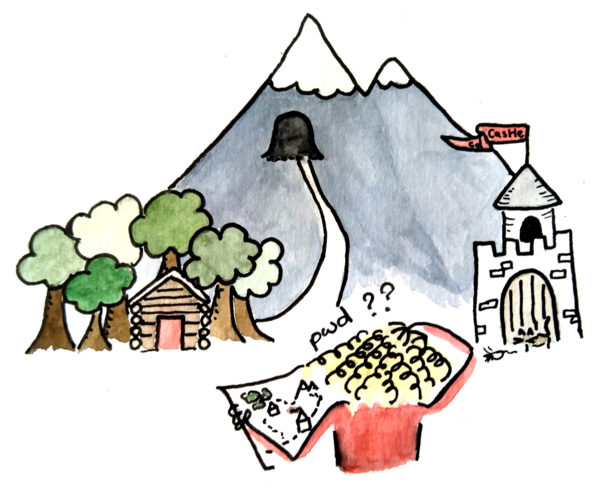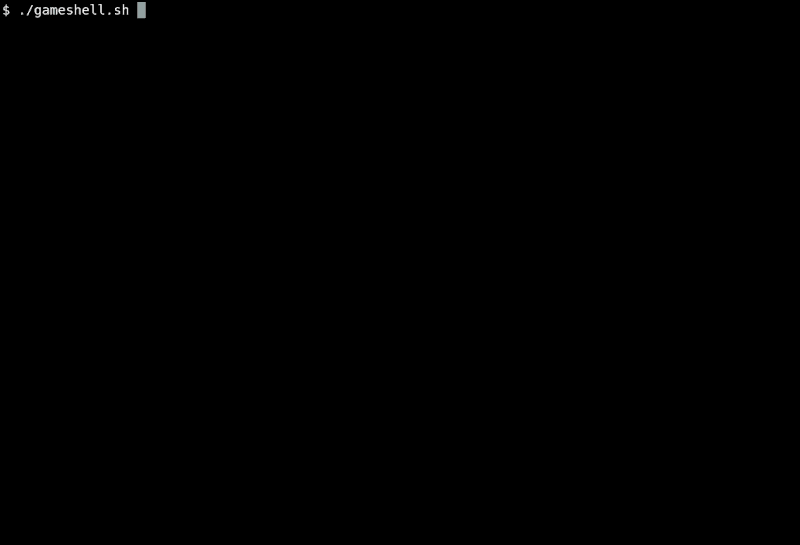Teaching first-year university students or high schoolers to use a Unix shell is not always the easiest or most entertaining of tasks. GameShell was devised as a tool to help students at the Université Savoie Mont Blanc to engage with a real shell, in a way that encourages learning while also having fun.
The original idea, due to Rodolphe Lepigre, was to run a standard bash session with an appropriate configuration file that defined "missions" which would be "checked" in order to progress through the game.
Here is the result...
GameShell is available in English, French and Italian.
Feel free to send us your remarks, questions or suggestions by opening issues or submitting pull requests. We are particularly interested in any new missions you might create!
GameShell should work on any standard Linux system, and also on macOS and BSD
(but we have run fewer tests on the latter systems). On Debian or Ubuntu, the
only dependencies (besides bash) are the gettext-base and awk packages
(the latter is generally installed by default). Some missions have additional
dependencies: these missions will be skipped if the dependencies are not met.
On Debian or Ubuntu, run the following command to install all game and mission
dependencies.
$ sudo apt install gettext man-db procps psmisc nano tree ncal x11-apps wgetCheck the user manual to see how to install the game dependencies on other systems (macOS, BSD, ...).
Assuming all the dependencies are installed, you can try the latest version of the game by running the following two commands in a terminal.
$ wget https://github.com/phyver/GameShell/releases/download/latest/gameshell.sh
$ bash gameshell.shThe first command will download the latest version of the game in the form of a self-extracting archive, and the second command will initialise and run the game from the downloaded archive. Instructions on how to play are provided in the game directly.
Note that when you quit the game (with control-d or the command gsh exit)
your progression will be saved in a new archive (called gameshell-save.sh).
Run this archive to resume the game where you left it.
If you prefer not running foreign shell scripts on your computer, you can generate a Docker image with the following:
$ mkdir GameShell; cd GameShell
$ wget --quiet https://github.com/phyver/GameShell/releases/download/latest/Dockerfile
$ docker build -t gsh .
$ docker run -it gshThe game will NOT be saved when you exit, and additional flags are required if you want to run X programs from inside GameShell. Refer to this section of the user manual.
To find out more about GameShell, refer to the following documents:
- The user manual provides information on how to run the game on all supported platforms (Linux, macOS, BSD), explains how to run the game from the sources, tells you how to generate custom game archives (which is useful if you want to use GameShell for teaching a class), and more.
- The developer manual provides information on how to create new missions, how to translate missions, and how to participate in the development of the game.
The game is currently being developed by:
- Pierre Hyvernat (main developer, pierre.hyvernat@univ-smb.fr),
- Rodolphe Lepigre.
- Pierre Hyvernat
- Rodolphe Lepigre
- Christophe Raffalli
- Xavier Provencal
- Clovis Eberhart
- Sébastien Tavenas
- Tiemen Duvillard
- Daniele Scasciafratte (@mte90)
- Paolo Mauri (@maupao)
- Marco Ciampa (@ciampix)
- Antonio Vivace (@avivace)
- Lorenzo Millucci (@lmillucci)
- Sirio Negri (@ziriuz84)
- Domenico Mammola (@domenicomammola)
- Leonardo Canello (@anulo2)
- @michirod
- @serhack
- WhiteShield (@wshield05)
- @gioisco
- All the students who found many bugs in the early versions.
- Joan Stark (a.k.a, jgs), who designed hundreds of ASCII-art pieces in the late 90s. Most of the ASCII-art encountered in GameShell are due to her.
GameShell is released under the GPLv3.
Please link to this repository if you use GameShell.
GameShell is open source and free to use. One way you can acknowledge the work it required is by sending an actual postcard to
Pierre Hyvernat
Laboratoire de Mathématiques, CNRS UMR 5127
Université de Savoie
73376 Le Bourget du Lac
FRANCE

